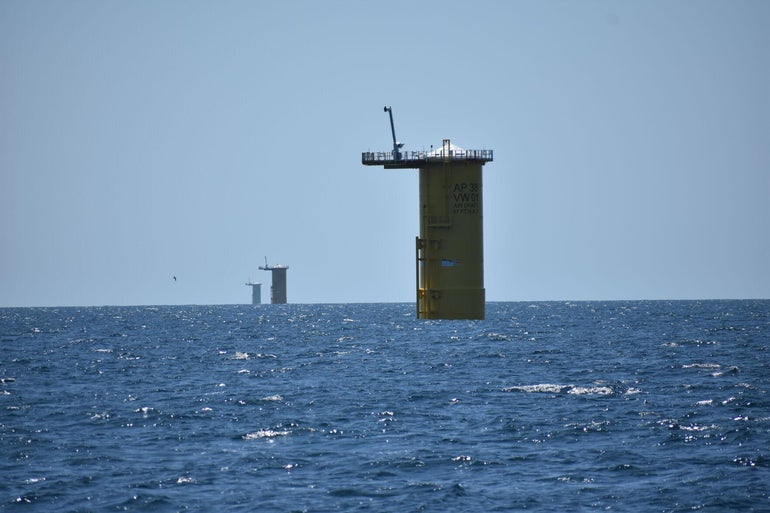Energy group says Trump’s mega-bill will slow clean power projects
 Image | Courtesy of State House News Service
Foundations for three of Vineyard Wind 1's 62 turbines were visible above the water in August 2023. A new site for wind turbines has been designated off the east coast of Massachusetts.
Image | Courtesy of State House News Service
Foundations for three of Vineyard Wind 1's 62 turbines were visible above the water in August 2023. A new site for wind turbines has been designated off the east coast of Massachusetts.
A national energy industry group worries the Trump administration's stance toward clean power projects will "add new layers of bureaucratic delay and inertia" at a time when states, including Massachusetts, are rushing to add capacity.
Executives at Advanced Energy United, which represents companies building large-scale solar, wind and energy storage projects as well as smaller-scale rooftop solar, cautioned Tuesday that a sweeping new federal law and regulatory changes pursued by President Donald Trump's team will make it more difficult to bring new power supplies online.
Harry Godfrey, the organization's managing director, said the so-called "big, beautiful bill" Trump signed "will slow and, in some cases, stymie deployment of advanced energy resources, particularly solar and wind."
"No two ways about it: it is going to destroy jobs, both at the project and manufacturing level. It's going to risk stranding investments in these, billions of dollars in private investments, and ... it is going to raise energy costs," Godfrey said during a virtual briefing.
Still, Godfrey urged those "writing the obituary" of the industry to "put their pens down," arguing that clean energy and energy storage companies have endured volatility and upheaval in the past.
The new law will quickly phase out tax credits for wind and solar projects, while allowing other sources such as advanced nuclear storage and hydropower to access credits for a longer period of time, according to Advanced Energy United. It also unwinds consumer credits for electric vehicle purchases.
Some backers of clean energy and battery storage suggested the tools could have bipartisan appeal. Matt Boms, who leads the Texas state chapter of Advanced Energy United, said Republican-controlled Texas on Tuesday got more than 60% of its power load from wind and solar sources.
"These technologies aren't painted red or blue or any other color," Boms said. "There are really smart and sharp leaders in Texas on both sides of the aisle at the state capitol that don't see the politics in energy and are genuinely interested in powering the economy, because the grid is the backbone of our economy in Texas."
Alongside the law, Trump and his deputies have been pressing through executive actions and regulatory changes to deprioritize clean power.
The Department of Interior last week announced that decisions about leases, rights-of-way, construction, grants and more related to wind and solar energy facilities will face an "elevated review" designed to put those sources on a more even footing with coal and natural gas.
Godfrey dubbed DOI's approach "very worrying."
"This seems to add new layers of bureaucratic delay and inertia to those projects, be they on public lands but also projects that might be developed elsewhere," he said. "We have spoken out about this, called it the antithesis of the administration's supposed express support for permitting reform or expediting energy development as part of an energy dominance agenda. We hope that they will certainly reconsider this memo and instruction, because we do see it as a real drag on industry development."
Massachusetts officials have long targeted offshore wind as a key industry to develop, arguing that it could help lower energy costs here while bringing thousands of new jobs in a high-paying industry. But the rollout has been stunted by a series of disruptions, including skepticism from the Trump administration.
The DOI announcement featured language critical of offshore wind, with Acting Assistant Secretary for Lands and Minerals Management Adam Suess saying the nation's energy dominance would be "driven by U.S.-based production of reliable baseload energy, not regulatory favoritism towards unreliable energy projects that are solely dependent on taxpayer subsidies and foreign-sourced equipment."
Godfrey said the federal government's stance could pose a "serious impediment" to offshore wind development in Massachusetts.
"I'm never going to say never about doing projects, but obviously, this is not a step in the right direction," he said.









0 Comments